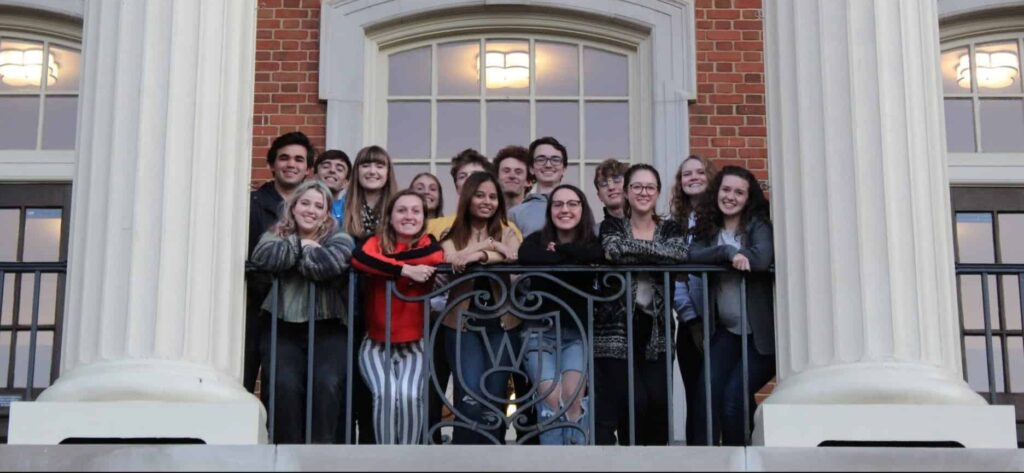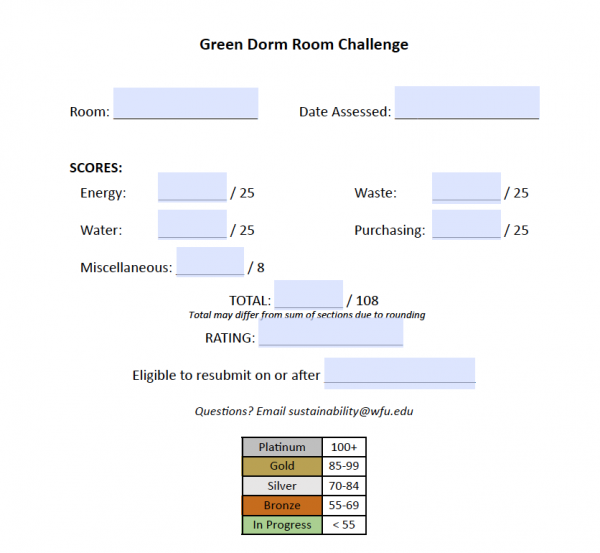First-Years Demonstrate Sustainable Leadership
Students in first-year residence halls can participate in a self-assessment of their sustainability efforts.
By: Caroline Walker (’22), Graphic Design Assistant for the Office of Sustainability. This article was originally published in the Old Gold & Black.
With the issue of climate change increasingly capturing the attention of the public, more and more first-year students arrive on Wake Forest’s campus with a passion for sustainability and a desire to become involved with environmental activism.
As a result, the Sustainability Leadership Group (SLG) was formed during the fall semester of 2019 when the program coordinator for the Office of Sustainability, Brian Cohen, decided to tap into the potential of first-year students.

The inaugural cohort of the SLG is composed of 29 selected students from the class of 2023 that had developed ecoconsciousness at an early stage in their college career, and will continue to influence others as sustainable leaders throughout their following four years on campus.
Many already knew that they wanted to become involved in sustainability initiatives, including freshman Meredith Power, an SLG representative from Luter Residence Hall who explained how the program appealed to her passion for promoting public awareness of environmental issues.
“I really wanted to make a difference,” Power said. “I’m from California, so I grew up where sustainability and climate change information was given to me from a young age, and I wanted to bring that to North Carolina.”
Pursuing this passion, Power worked alongside her fellow student leaders during the fall semester to conduct sustainability outreach in the university’s seven first-year residence halls. Through interactive boards and activities, including the “Choose to Reuse” outreach and a recycling sorting games, participants became informed about environmentally friendly habits that students could practically incorporate into their daily lives and habits.
Additionally, the SLG representatives talked to resident advisors about ways to incorporate principles of sustainability, such as waste reduction or energy conservation, into college dorm life and held meetings to increase residents’ acknowledgement of their environmental responsibility.
From sharing information with their peers to initiating conversations about sustainability with stakeholders, SLG provides members with valuable experience in formulating ideas, collaborating with others and directing their own projects. Some, like SLG representative freshman Sam Lowenhar from Babcock Residence Hall, have never been involved in a sustainability or leadership club before.
“It gives me an opportunity to learn more about sustainability and teach others,” Lowenhar said. “For the most part, [first-years] run this. We talk about ideas and debate things.”
After educating their peers about sustainable practices last semester, the SLG representatives decided to focus their efforts this semester on holding a friendly competition, called the Green Room Challenge, between residents in the first-year residence halls for highest achievement of sustainable living practices.
The project operates through a self-assessment that provides students with the ability to evaluate their personal habits in respect to levels of sustainability, and reflect on whether they are being eco-conscious on a daily basis.
When completing the assessment, they will have to consider their performance in four main categories of sustainability — energy, waste, water and purchasing — that are each worth 25 points and a miscellaneous section worth eight additional points, for a total possible score of 108.

The practices and habits evaluated include how often respondents properly sort recyclable material when disposing of waste in their residence halls, wait to wash dirty articles of clothing until they have a full load, immediately report a maintenance issue or attend sustainability-related events.
According to frehsman Lydia Evans, one of the SLG leaders in Luter, the goal of this project is to heighten student’s awareness of sustainable or unsustainable elements of their residential lifestyles so that they can start thinking more about the environmental impact of their daily actions and decisions.
“The big motivator for me is the education aspect, because I think that a lot of what bars people from engaging in sustainable habits is that they don’t know what they are,” Evans said. “This is going to draw people’s attention to those things, so my hope is to get as many people as possible to participate.”
In hopes of meeting their goals for participation and education, the SLG leaders are sending out the self-assessments to residents of their halls this week.
After the responses are graded on a rolling basis, participants will receive Green Room Certifications with colors highlighting different levels of sustainable achievement — green for “in progress,” bronze for at least 55 points, silver for at least 70 points, gold for at least 85 points and platinum for at least 100 points.
Yet, the numerical outcome of the self-assessment scores is less important to the SLG members than the fulfillment of the project’s educational purpose of increasing awareness about environmental responsibility and sustainable living practices.
“The project opens the door to conversation about improvement,” Powers said. “We just want to get people thinking about their habits so that they can improve them.”
That is why participants in the Green Room Challenge who are not pleased with their initial rating are encouraged to implement more sustainable practices over the course of the semester. After a period of one month, they can resubmit the self-assessment so that their new living practices and habits can be re-evaluated.
By transforming routine actions like recycling into a personal challenge to become more sustainable, the SLG leaders have appealed to the competitive drive that propels “Work Forest” to excel in their academic efforts and channeled that positive energy into improving their environmental consciousness and sustainable achievement.
“I’m hopeful that the project will make students’ resource conservation habits and sustainability involvement more visible,” Cohen said. “Wake Forest students care deeply about the impact their actions have and are becoming increasingly mindful about the decisions they make, especially in relation to sustainability and climate change. By making these decisions more public through a friendly competition, we hope to create opportunities for conversation, unity and action.”
